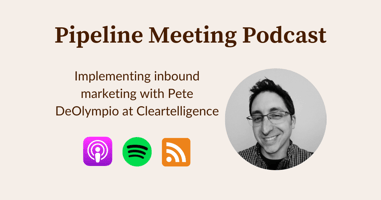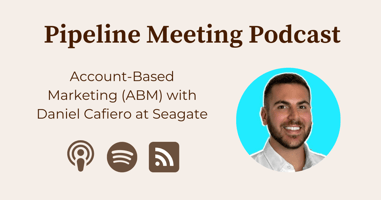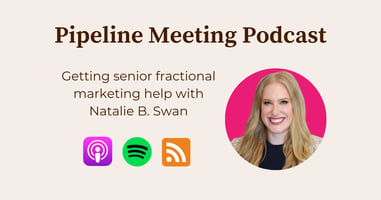Pete DeOlympio just implemented inbound marketing at a professional services firm with over 100...
First 90 days as head of marketing with Jennifer Durishin at Prodigal
Jennifer Durishin is the new head of marketing at Prodigal. Well, new-ish. She got through her first 90 days as head of marketing, shares how she approached it, and what other SaaS marketers might want to keep in mind.
Show Description
Where B2B marketers come to talk sales. 15-minute interviews published every Monday and Wednesday morning. For heads of marketing and founders who support a sales team.
Subscribe
Popular Platforms
Apple Podcasts
Spotify
RSS Feed
Also available:
Amazon | Anghami | Castbox | Castro | Deezer | GoodPods | Google Podcasts | iHeart Radio | Overcast | Pandora | PlayerFM | Pocket Casts | Podcast Index | Podchaser | Stitcher | TuneIn
Show Notes
Jennifer Durishin is the new head of marketing at Prodigal. Well, new-ish. She got through her first 90 days as head of marketing, shares how she approached it, and what other SaaS marketers might want to keep in mind.
Jennifer specifically talks about a first 90-days framework that she got from Gartner, which she learned about through a community of go to market professionals called Pavilion and in another community by 6sense.
She shares more about what Prodigal is building, how her marketing team is structured, and her first steps in starting her new role.
Other topics include the role of marketing agencies, learning and development (L&D), sales enablement, customer onboarding, working cross-functionally, and measuring performance.
Follow Jennifer Durishin on LinkedIn: https://www.linkedin.com/in/jennifer-durishin/
Learn more about Prodigal: https://www.prodigaltech.com/
Transcript
[00:00:00] Introduction
[00:00:00] Harris Kenny: Welcome to Pipeline Meeting where marketers come to talk about sales. I'm your host Harris, Kenny, and I'll be joined by guest every Monday and Wednesday for brief 15 minute interviews where we'll share tips that you can apply to support your sales team and help them close more deals.
[00:00:15] Harris Kenny: If you don't have time to listen to this whole episode, you can skip ahead in the show notes in your podcast player, or find the transcript at introcrm.com/podcast. All the episodes are published there.
[00:00:28] About Prodigal
[00:00:28] Jennifer Durishin: We are a vertical SaaS company focused on the consumer finance industry, and we are bringing technology to these very highly regulated companies, all the way from banks. And lenders, debt buyer's, auto finance companies and even collection agencies who are very highly regulated, have to meet compliance standards.
[00:00:51] Jennifer Durishin: And we are bringing technology to help them record their phone calls, to have a hundred percent QA, quality assurance compliance, to automate notes from these very regulated con conversations they're having.
[00:01:06] Jennifer Durishin: And then even we just launched a product called Pro Assist that gives realtime agent coaching while they're on the phone so they can be more empathetic and ultimately, You know, generate more revenue or be more effective in their servicing.
[00:01:23] Jennifer Durishin: The awesome thing about our tools, all three of these products though, is that they're learning and getting better and better over time. And because we're exclusively focused on the, the consumer finance vertical is that we know some of these nuanced things with things like bankruptcy or other areas that maybe other products won't know if they're just doing this for airline, there's something else.
[00:01:48] Jennifer's First 90 Days
[00:01:48] Jennifer Durishin: Before I started, it was really important that I did some prep. By talking to people, they said, oh, you definitely need to have this book the first 90 days.
[00:01:56] Jennifer Durishin: And there's another book Leaders 100 day Action plan. And so I got those skimmed through those.
[00:02:02] Jennifer Durishin: But believe it or not, the framework I'm actually using is from Gartner.
[00:02:06] Jennifer Durishin: They have something called the CMOs First 100 days, and they have it in five stages, prepare, assess, plan, act, and measure.
[00:02:16] Jennifer Durishin: Prepare, it's actually even before you start.
[00:02:18] Jennifer Durishin: Then assess is really about talking to your team. I talked to customers as well. I talked to a lot of customers and it was not just specifically about our products, but it was really more strategically about the challenges they're facing in their industry.
[00:02:34] Jennifer Durishin: And then I also talked to many of my cross-functional partners.
[00:02:37] Jennifer Durishin: As much as you want to jump in and start doing, really important to do that assessment.
[00:02:44] Jennifer Durishin: For sure there are quick wins that had to happen and did happen early on, but really kind of putting all this stuff together so you can build out an effective plan.
[00:02:53] Jennifer Durishin: One other last piece I wanted to add too is that we are a fully remote team, and so, you know, our headquarters are in California. I've been out there twice to meet with people, including my boss, who's the CEO, but others were out there as well.
[00:03:05] Jennifer Durishin: And then, I even held a marketing offsite where the marketing team got together, so that was really important in this remote environment.
[00:03:12] Harris Kenny: Where'd you do the offsite?
[00:03:15] Jennifer Durishin: I actually had them come to Columbus, Ohio where I'm based, because I was flying out to California later that week. So it worked out well. Got my team's input into the plan that I had developed.
[00:03:26] Jennifer Durishin: It's just amazing what those in-person meetings do to help generate comradery and have us be even a more effective, uh, team even early on.
[00:03:35] Meet Jennifer's Team
[00:03:35] Harris Kenny: Can you tell me about leading that team of five marketers, and what's the breakdown of responsibilities across the team in terms of just generally speaking, the hats that they wear?
[00:03:43] Jennifer Durishin: That was one of the things that attracted me about this role specifically as well. We are a venture funded startup and the fact that there's already five marketers on the team shows me that they invest in the marketing function.
[00:03:55] Jennifer Durishin: So I've got five team members.
[00:03:57] Jennifer Durishin: First is a product marketer. Really responsible for working directly with product, and then how do we bring these new product launches to market.
[00:04:04] Jennifer Durishin: Secondly, we have a content marketing manager. She's really responsible for building a lot of our content, like white papers and case studies, and even a blog that we have.
[00:04:14] Jennifer Durishin: We're trying to build up some more thought leadership in the space, which takes time as a longer game, but she's really, um, done a lot of that.
[00:04:23] Jennifer Durishin: Third, we've got a growth marketer or demand gen marketing manager, whatever you wanna call it these days. I kind of think about that role as they take the content that was developed and figure out the best way to distribute that digitally. What's the most effective way to reach our target audience?
[00:04:40] Jennifer Durishin: Fourth, I've got a designer. So the team had realized, hey, we were spending a lot of money and time externally using a freelancer, and so they wanted to bring someone on full-time. That's been wonderful to have. Last but not least, we've got our event marketing manager. she's a community manager. With an early stage SaaS company, I'll start with the community manager, we know it's really, really important to be talking to our customers, making sure that they're engaged and they're happy so we can retain them.
[00:05:09] Jennifer Durishin: We're gonna be doing more with that customer slash community marketing with her.
[00:05:13] Jennifer Durishin: And then events. With our industry, we know it's really important to go and be at events and thankfully they're back in person.
[00:05:20] Jennifer Durishin: We've invested a lot, uh, so far to date This. And events, and we don't even have an agency to do all of that, like getting our a booth there and registering and planning all the side events. So she does all of that, uh, for us here.
[00:05:33] Hiring Agencies
[00:05:33] Harris Kenny: You're in this regulated industry, so I feel like having a stable in-house team that understands the nuances of what you can say and what you can't, I feel like that is gonna allow you to move a lot faster versus agencies, and you're going back and forth with the red lines about, oh, we can't say this, we can't say that we couldn't advertise there is, is that right? Is my perception correct that having that is helpful?
[00:05:56] Jennifer Durishin: I've come from a lot of very highly regulated industries from healthcare and insurance and nutrition. I would say that's not really the number one reason why we're doing that. I think it's really to, you do have more experts. My viewpoint is there's certainly great benefits for having in-house team.
[00:06:16] Jennifer Durishin: There's also great benefits to using agencies and the more specific the agencies are, the more specialized the agencies are, the the better. That's where my head is at these days, and so, Really where I'm at too is assessing what the team is doing, assessing our capacity, but then where are those opportunities for us to get even like more, more, more current perspective or fresher perspective or, Hey, who's this SEO expert? How do we get them?
[00:06:42] Jennifer Durishin: We've generated and built a lot of really good content, but how do we get more of our target audiences eyeballs on this thing through organic, right? Instead of having to do all this paid, what's that better mix? We can balance using those agencies.
[00:06:56] Marketing L&D
[00:06:56] Harris Kenny: How do you feel about L&D for the team? Is that something that was in place? Have you invested in any programs or talk to the team if they wanna do any professional development for marketing specific stuff outside of maybe corporate training.
[00:07:10] Jennifer Durishin: Great question. I think in startups sometimes, we don't always, you know, have that at the top of, of the roster, but I think that's something that's really important. It's something that I think about as leading a team and some of my team members don't have a ton of work experience and so. I found it really important to always be learning.
[00:07:28] Jennifer Durishin: I especially think it's important in marketing, and so we don't have a specific, hey, L&D or learning and development bucket of money, but you know where there are opportunities and so that's something like, we've talked about books that we, you know, read and which books are you finding value from or what did you get from this?
[00:07:47] Sales Enablement
[00:07:47] Harris Kenny: How does your marketing team interact with the sales team, and what does sales enablement look like at Prodigal in terms of how the company goes to market?
[00:07:56] Jennifer Durishin: Yeah, so we work really, really closely with the sales team. And in fact, when I started, you know, as I talked to the head of sales, I was like, Hey, As much as you guys are tied to revenue, we, in marketing, all of us are tied to revenue. And so it's one of the things I brought in early is just helping my team understand too, that we are here to bring in qualified leads to sales so they can book revenue.
[00:08:18] Jennifer Durishin: So it's not, it's not a a quantity game, it's, it's quality, right? We need the best leads over to them. And so we work really closely with them helping them, you know, figuring out, hey, what do they need?
[00:08:29] Jennifer Durishin: And in fact, one of the early wins was a one sheeter on, customer onboarding.
[00:08:34] Jennifer Durishin: Once we have someone who signs an account, you know, what do they have to share with them?
[00:08:38] Jennifer Durishin: And it was actually a very much a cross-functional effort, but we're really working with them all the time to understand what they need. We have SDRs, but you know, marketing is responsible for creating a lot of that content to make sure sales has that content that's put in front of prospects along the journey.
[00:08:57] Customer Onboarding
[00:08:57] Harris Kenny: So you see onboarding as bridging marketing and sales, all the way through customer success. Not just, oh, we closed the, you know, we, we generated the lead sales, closed it, you know, throw it over the fence. Not our problem.
[00:09:11] Jennifer Durishin: A hundred percent. Like we need to be part of that whole journey.
[00:09:14] Jennifer Durishin: In SaaS, it's really important to say, Hey, once we sign a new new customer, it's new revenue, but we really need to retain them. And that's why we're actually doing some efforts around, you know, customer marketing, how do you upsell them, how do you retain them? How do you eventually make them advocates?
[00:09:32] Jennifer Durishin: That is the holy grail as well, because we know things like social proof and them hearing from other customers, Hey, this really is the greatest thing since slice bread. You really need to check this out. Having another customer say that is way more powerful than any marketing we can do straight from our mouths.
[00:09:49] Jennifer Durishin: So we're really investing in that. I think that's a big opportunity.
[00:09:52] Working Cross-Functionally
[00:09:52] Harris Kenny: What has the response been from the other like department leads or heads? Have they been excited that marketing is seeing that as part of the life cycle, or are they like, Hey, get outta my business. This is my sandbox, because I feel like some marketers are afraid to dip into these other adjacent areas because maybe it's not their job or there's not a clear line in the org chart where they would have responsibility there.
[00:10:18] Harris Kenny: but it seems like it's adding a lot of value for what you're doing. So I'm curious how people respond to that.
[00:10:23] Jennifer Durishin: I'll give credit to my, my new CEO I mean, he's really, he's the one who said, Hey, you've gotta talk to customers. As we think about, hey, keeping and retaining those customers, that's something that's back to the revenue. At the end of the day, we are on a rocket ship, we've got huge goals and so that's one way where we. We can help get there faster.
[00:10:42] Jennifer Durishin: So far people understand that that's something we need to do. And then it's not just, you know, us doing something on an island, but then communicating too with our customer success partners. Hey, this is our plan.
[00:10:56] Jennifer Durishin: We wanna work in partnership with you guys. Here are some areas of opportunity. Uh, you know, how do we get more G2 reviews, right? People still look at software sites. And so how do we work with you guys to get more of our customers to give us G2 reviews, like very tactically. But we're finding some good success early on so far with that.
[00:11:12] Measuring Performance
[00:11:12] Harris Kenny: Do y'all do like OKRs or some, some equivalent measurement for the teams so that the different managers are talking the same language, or is each department responsible for setting their own sort of unique ways of measuring how they're doing.
[00:11:25] Jennifer Durishin: So far we're all kind of doing our own thing. And that's one of the things I did early on though, is just from a marketing standpoint, you know, what is the dashboard we have? What are our targets? Establishing what those targets should be and then sharing them with sales. And so I kind of did a, a bottoms up and then sales is like, Hey, based on this, you know, you need this.
[00:11:43] Jennifer Durishin: Now it's like we're trying to figure out that gap and. How we accelerate some of our marketing.
[00:11:49] Jennifer Durishin: Those are just kind of baseline, really, really important things to do early on. But just kind of getting a lay of the land and then figuring out, okay, how do we go from here to there and then next year from here to there, like keep making those jumps.
[00:12:04] Jennifer Durishin: Because in SaaS we know too, like what got you here won't get you there. And so you have to always be evolving and learning and learning quickly. Testing and learning quickly is also really, really important.
[00:12:16] Conclusion
[00:12:16] Harris Kenny: Yeah. That's great. Where did you find this Gartner book? It seems like your off to the races here was, was it just on their website? Is it on Amazon bookstore? How did you, how did you decide to dig into this and where'd you find it in the first place if someone wants to read it?
[00:12:31] Jennifer Durishin: I find a lot of my great tools from some of the communities I'm in with marketers. I think this one particularly came from pavilion. They've got a Slack community or they've got classes as well. And then I'm also part of 6Sense, they've got a CMO community and you can kind of go there for any resources.
[00:12:47] Jennifer Durishin: Those are kind of my two go-to places. I'm guessing This one came from Pavilion. It was so good. You know, when something is so good you actually printed out, like, I have it printed out . So, um, yeah, that's where, you know, I like frameworks. I feel like some of the, the stuff from first 90 days, It's, it's not new it's kind of antiquated a little bit.
[00:13:08] Jennifer Durishin: SaaS companies are different. I grew up in big companies, spent a lot of time working for very big companies, like things move slower. Here, you gotta do a lot more things in a short amount of time.
[00:13:18] Jennifer Durishin: It's a different timeline and for someone like me who, who loves to move fast, is Im impatient and is hungry, I think it's a good place for, for me and hopefully, um, my team feels the same way.
[00:13:30] Jennifer Durishin: Cause I think we got an amazing team and an amazing, you know, group of people here at the company. Really, really trying and striving. And deep down, wanting to make a big difference for these, these folks who, you know, collection agencies have a really negative reputation. And it's unfortunate because what they do, they serve a really noble purpose in the industry and in the economy.
[00:13:52] Jennifer Durishin: And without them, you know, we wouldn't be able to get money or get loans if people don't hold people accountable for, for paying it back and working with them. You know, certainly all of us have had certain, you know, we go through ups and downs in life and things happen, but they're working with these folks and banks and, and servicing.
[00:14:11] Jennifer Durishin: They're trying to work with people to understand, okay, what are the circumstances? How can we work together and get you moved on from this? We're trying to help those who help others is something that I see as our purpose as well.
[00:14:23] Following Jennifer Durishin
[00:14:23] Harris Kenny: You've mentioned some communities you're in, but in case someone's not in those or they just wanna follow you along and see 180 days and 270 days in the prodigal journey, where can folks find you online?
[00:14:34] Jennifer Durishin: Yes, they can find me on LinkedIn. I post there on occasion at Jennifer Durishin and you can see me at Prodigal there.
[00:14:42] Closing Credits
[00:14:42] Harris Kenny: That's all for now. You can find show notes at intro crm.com/podcast. The theme music for Pipeline Meeting is by Neighbourhood Vandal. If you learned something, consider sharing this show with a friend. Thanks for listening.



